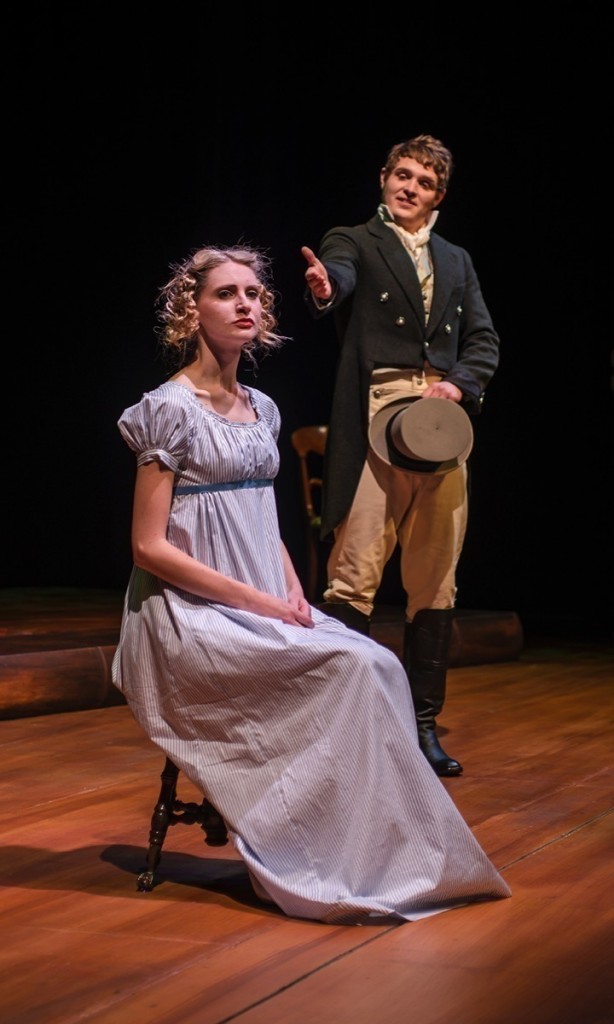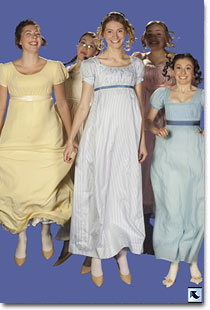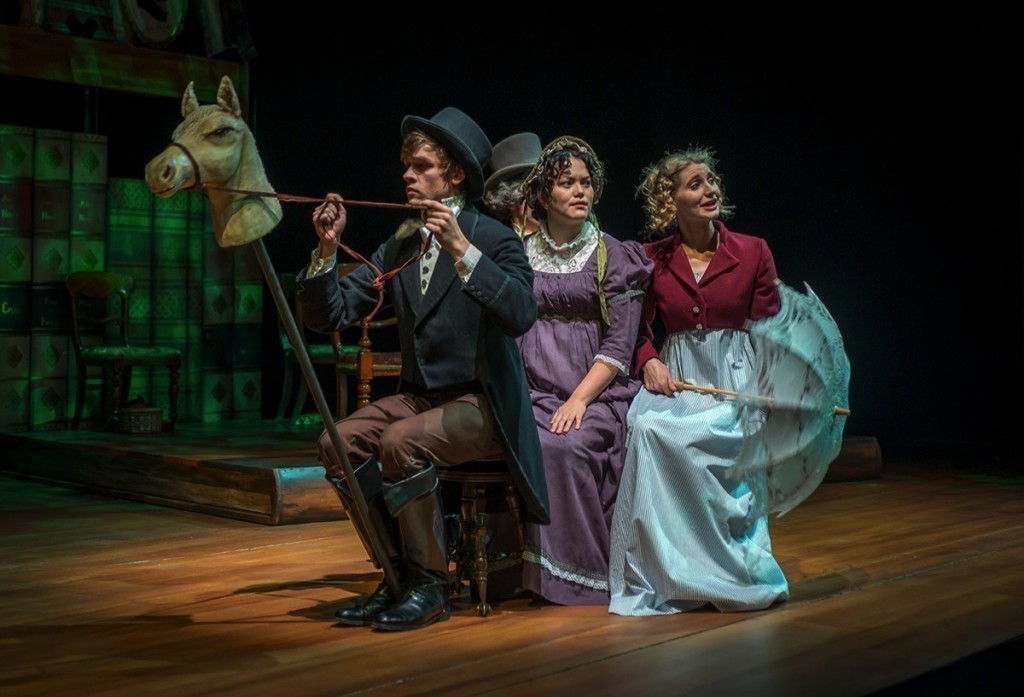
Credit: Nancii Bernard
At the Frederic Wood Theatre until November 30
604-822-2678/www.theatre.ubc.ca
Posted November 17, 2013
Adapted by Jon Jory from Jane Austen’s novel, Pride and Prejudice opens with the famous line, “It is a truth universally acknowledged, that a single man in possession of a good fortune must be in want of a wife”. But in Austen’s day it was even more true that a woman without means must be ‘in want of a husband’ for there was little opportunity except through marriage or inheritance for women to achieve financial security. If a woman did have an inheritance and/or land, upon marriage it was all transferred to her husband and then, after his death, to her sons or male cousins.
In the novel and in the play, country gentleman Mr. Bennet (Nathan Cottell) and his wife Mrs. Bennet (Bethany Stanley) have five daughters. Upon Mr. Bennet’s death, the house in which they all live will go to his ridiculous distant cousin, Mr. Collins (Luke Johnson) who in all likelihood will turn Mrs. Bennet and the girls out.

Credit: Tim Matheson
It’s imperative that these girls – Elizabeth (Kat McLaughlin), Jane (Morgan Churla), Mary (Natasha Zacher), Lydia (Sarah Harrison) and Kitty (Catherine Fergusson) – marry well. And soon.
Along comes rich, handsome Mr. Darcy (Matt Kennedy). He has all five Bennet sisters to choose from plus all the eligible girls in town.
In this UBC Theatre production, directed by Lois Anderson, Shelby Bushell’s set looks like a very large bookshelf with old leather bound books as the floors and walls; a staircase curves up to an ‘upper shelf’ with books and picture frames into which characters appear. It’s all very 18th-early 19th century looking: a bit ‘archival’ with discreet lighting by Chengyan Boon. Music throughout is Chopin, I think, and is romantic with a hint of melancholy. Music right at the end is contemporary and seems abruptly out of place.
The film version relies heavily on green and rolling English countryscapes, splendid horse-drawn carriages, elegant manor houses and fancy balls. But the pleasure in Austen lies so much in what the program note by SFU’s Michelle Levy refers to as “Austen’s characteristic eloquence and economy of language”. Added to that are Austen’s sharp wit, finely tuned sense of irony and clever use of repartee – especially between warring, would-be lovers. On stage, as opposed to the novels or film, there isn’t the time to savour the play of language and so it boils down, in large part, to the plot.
Once you examine the plot of Pride and Prejudice, you have to ask whether the marriage Elizabeth makes has been worth the struggle. Mr. Darcy, after all, is so much dimmer than Elizabeth or, at least, appears so in this production. Handsome, yes. But quick? Not so much. Married to Mr. Darcy, Elizabeth may have to start writing novels – as did Jane Austen – to stave off boredom.
This is very much a student production and it is early in the run. Some of the actors speak too quickly and will learn that although their character may speak a mile-a-minute, an actor may not if he/she wishes to be understood. Yelling, and too often, wears thin.
But outstanding in this production is Kat McLaughlin as corkscrew-ringletted Elizabeth. McLaughlin is clever and cheeky enough to make us admire Elizabeth. Ironically, while the women of the period needed to marry and marry young, they were prohibited by social niceties to putting themselves forward. McLaughlin gets this just right: a little flirtatious, a little sly, but nothing more. She’s quick, sprightly and very playful.
Its shortcomings aside, this Pride and Prejudice played to a very appreciative, almost full house the night I attended – the third night of its sixteen-night run. Perhaps it will send audiences back to the novel to roll around in all that elegant, curlicued language.

Credit: Nancii Bernard

